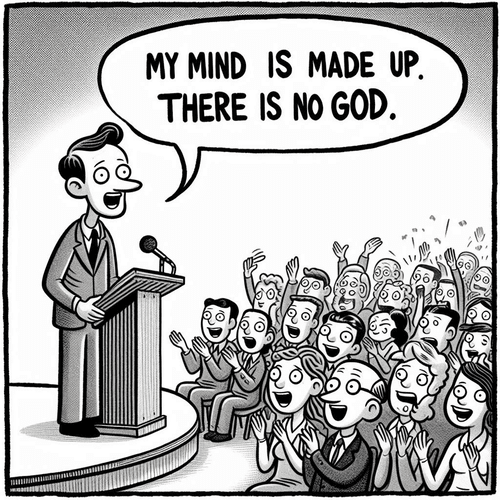Examining the Truthfulness of the Statement “There is no God”
Testing the Truth Claim “There is no God”
Over the past several weeks, we’ve done a deep dive into arguments and evidence related to the core question—Does God exist? We’ve covered scientific considerations, philosophical arguments, addressed objections, and looked at the profound implications of this issue.
To evaluate the truthfulness of the statement “There is no God,” let’s put it through the three-fold test—of INTERNAL COHERENCE (logical consistency), EXTERNAL CORRESPONDENCE (factual accuracy), and FUNCTIONAL ADEQUACY (real-world liveability). Let’s examine how the atheists’ claim fares:
Internal Coherence First, is the statement “There is no God” logically consistent and free of internal contradictions? At first glance, it may seem a simpler, more straightforward position to adopt than asserting the affirmative. However, articulating a comprehensive atheistic worldview quickly runs into rational troubles.
If the universe is purely material, with no transcendent source, how can abstract realities like reason, logical and mathematical laws, or even consciousness itself, be properly accounted for? Where do the immutable concepts of truth, morality and human value reside if not in an ultimate Mind? The atheistic denial of God creates troubling philosophical incoherence that undercuts rationality itself.
External Correspondence Does the statement “There is no God” align with objective reality and the observable evidence? As we saw in multiple recent posts, purely naturalistic explanations face formidable hurdles:
-
The extreme fine-tuning of the laws of physics and constants for life’s existence points to intelligent design.
-
The specified complexity in even the simplest replicating cell screams for an intelligent source beyond blind chance.
-
The origin of the entire physical universe from literal nothingness defies reason without an ultra-intelligent First Cause.
-
The existence of profound objective moral truths intuited across cultures requires an ultimate moral law-giver.
Thus, the statement affirming God coheres far better with the world and universe we actually observe around us than a strict denial of a transcendent Mind or reality.
Functional Adequacy But perhaps most crucially, what is the real-world impact of the statement “There is no God” when applied consistently? Does it lead to human flourishing? Throughout history, starkly materialistic worldviews that reject God have proven culturally and socially devastating.
The loss of any objective basis for human dignity, value, or fundamental rights has enabled unimaginable cruelty and evils. The undercutting of absolute moral truths opens the door to ethical anarchy and the rule of might rather than right. Robust belief in God’s reality has demonstrably provided the necessary foundations for ethics, reason, science, human rights, and societal progress to thrive.
On a personal level as well, rejecting God leaves us bereft of ultimate meaning, hope and purpose in the face of life’s tragedies. The “There is no God” statement fails abjectly in generating human flourishing and well-being when taken to its logical conclusions.
Having carefully evaluated the statement “There is no God” through the three prisms of logical consistency, factual accuracy, and real-world liveability impact, the verdict is clear—it falls woefully short of the mark of truth on all fronts.
The cumulative weight of evidence across scientific, philosophical, moral, historical, and experiential realities aligns overwhelmingly in favour of the statement “There Is a God” over its negation. To deny God’s reality requires wilfully rejecting both objective reality and subjective human flourishing.
So for those sincerely engaged in pursuing truth—wherever it leads—the path clearly points toward the affirmation that God does indeed exist as the transcendent, intelligent Source and Ground of all reality. As we move forward, acknowledging and understanding this profound truth becomes the vital next step.
Related Reads
Editor's Pick

Ephesians 1:13: Was the Spirit’s Indwelling Promised of Old?
When Paul declares believers are “sealed with the promised Holy Spirit” in Ephesians 1:13, one word jumps off the page: [...]

Monergism vs Synergism: Is Salvation God’s Work Alone?
When God saves us, does He do it alone, or does He need our help? The question isn’t mere theological [...]

Was Jesus Abandoned by the Father on the Cross?
WHY WE ANSWER IN THE NEGATIVE “My God, my God, why have you forsaken me?” These words from the cross [...]

Why Do Some Respond to God’s Call While Others Don’t?
THE REFORMED VIEW ON OUTWARD AND INWARD CALLS EXPLAINED Picture this: Two neighbours attend the same church service. They hear [...]

Does Ocean Salt Content Prove a Young Earth?
A COMPELLING LOOK AT MARINE CHEMISTRY AND EARTH’S TIMELINE The Salt Question That Challenges Deep Time: If Earth’s oceans have [...]
Noah’s Flood: Where Did All the Water Come From? And Go?
The question hits every Bible-believing Christian at some point: “If Noah’s flood covered the whole earth, where did all that [...]

No Marriage in Heaven? What Does Mark 12:25 Mean?
“Will I see my spouse in heaven? Will we still be married?” These questions pierce the heart of every Christian [...]

The Terror of Meeting God: What Isaiah 6 Reveals About Divine Holiness
WHEN ‘WOE IS ME’ IS THE ONLY PROPER RESPONSE TO A GLIMPSE OF GOD Picture this: You’re a prophet of [...]

Is the Holy Spirit Present in Unbelievers? The Biblical Answer
Can someone who doesn’t believe in Jesus Christ have the Holy Spirit living inside them? This question strikes at the [...]

The Gap Theory Exposed: Why Embrace a Young Earth?
The Gap Theory proposes there’s a vast time gap—millions or billions of years—between Genesis 1:1 (“In the beginning God created [...]
SUPPORT US:
Feel the Holy Spirit's gentle nudge to partner with us?
Donate Online:
Account Name: TRUTHS TO DIE FOR FOUNDATION
Account Number: 10243565459
Bank IFSC: IDFB0043391
Bank Name: IDFC FIRST BANK




